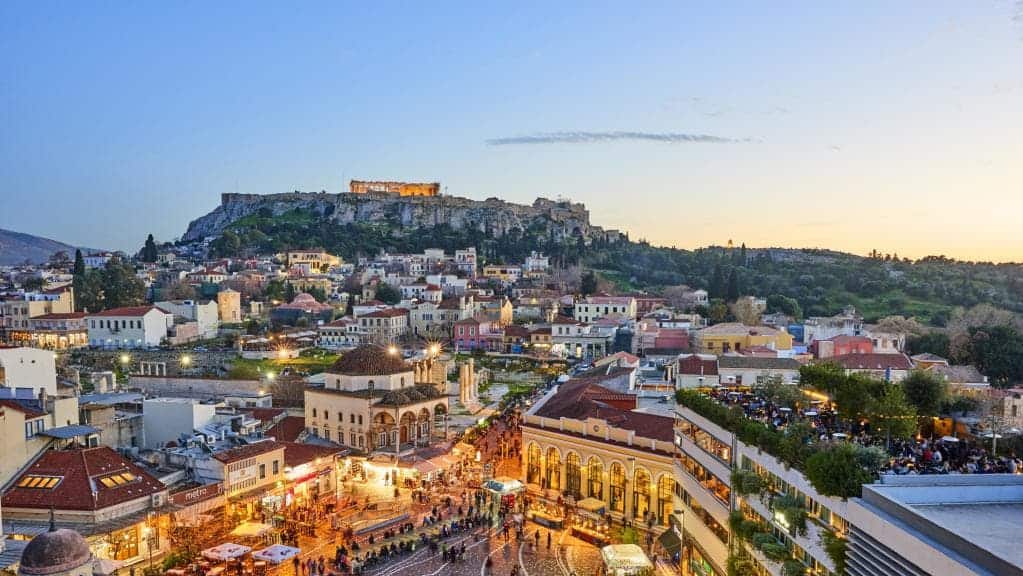
The capital of Greece is the home of ancient world treasures and is full of all the beauty that comes with troves of ruins and antiquities, many of them dating back to the 5th century BC, which puts these current times into proper perspective. Athens has modern marvels as well, plus an inviting Mediterranean climate that lends itself to visiting any time of year.
But travellers who are considering booking a trip often find themselves wondering, “Is Athens safe to visit?”—especially in the years since Greece has hit hard economic times, and since Europe has seen terrorism spike.
SmartTraveler says tourists should rest assured that Athens isn’t dangerous. Crime statistics point toward the fact that it’s actually quite a safe city for travellers, as Athens is not included on lengthy lists of the world’s most dangerous cities, and a 2019 crime index from Numbeo put the Greek capital at number 130 on the list, rating it safer than cities such as Tampa, Florida and Dublin, Ireland.
However, like travelling anywhere else in the world, there are certain things that travellers to Athens should keep in mind to ensure the safest possible visit.
According to SmartTravel-
Tips for Staying Safe in Athens
- Steer clear of the areas that are known to be dangerous in Athens, including the nightclubs of Glyfada Square, as well as the semi-frequent protests and demonstrations that happen near political centers.
- Stay vigilant for pickpockets and other petty thieves, since these are the most common crimes targeting travelers in Athens. Be especially cautious at crowded attractions, on public transportation, and in taxis, where drivers sometimes scam their passengers.
- Be aware that prostitution is legal in Athens—but that most of the city’s prostitutes operate outside the law, either because they are victims of human trafficking or because they don’t take the proper medical precaution. Do not partake, and stay away from the seedy areas where prostitution is rampant.

Safe Places- and Places to Avoid-In Athens
When keeping in mind areas to be more cautious at in Athens, know that Omonia, Exarcheia, Vathi, and Kolokotroni Squares have high crime rates and you should be vigilant here at night. These areas of Athens can be dangerous in part because they’re frequented by anarchist groups, as well as drug dealers and thieves—even children who are thieves. As for other areas of Athens to be careful at, Monastiraki and near the railway stations of Larissa and Peloponissos are crime hot spots, while the nightclubs of Glyfada Square are associated with organised crime.
Protests are semi-common in Athens, especially at Syntagma Square, which tends to be the political center of things. Travellers should bear in mind that political protests can occur randomly and occasionally turn dangerous—so steer well clear. If you somehow find yourself near a large gathering, be extremely cautious, do not cross police lines, keep a low profile, and monitor local media for updates and instructions.
In addition to knowing the dangerous areas in Athens, it’s also good to know where the city’s safest places are. In northern Athens, the neighborhood of Kolonaki is safe even at night and boasts high-end restaurants and art galleries. Metaxourgio, previously an impoverished neighborhood, has been gentrified and is now a popular and safe place to explore during the daytime, especially for lovers of the arts. In addition, Plaka and Psirri offer friendly cafes where you can get a lively taste of Greek life and culture.
How to Get Around Safely in Athens
The most prominent form of crime in Athens is, as you might guess, pickpocketing. By all accounts, pickpocketing, purse snatching, and other forms of petty theft are common, especially at crowded tourist attractions, nightlife destinations, and on buses and trains, where you should take extra care to guard your belongings. Be particularly vigilant if someone seems like they’re trying to distract you; meanwhile, someone else may be reaching into your purse. Keep your wallet in your front (not your back) pocket, and consider investing in a slash-resistant backpack with a reliable zipper.
Be careful, too, if you’re planning to take taxis in Athens, as there are taxi scams. Whenever you get into a taxi in Athens, make sure that it’s licensed and official, that your driver turns on the meter when he starts driving (not before, and not never), that you and your driver have agreed on at least a ballpark range for the fare, that you know the directions to where you’re going (speak up if your driver starts to take a roundabout route), and that you’ll be willing to call the police if you’re being ripped off—this will usually get your taxi driver on the right path again.
Prostitution in Athens
Prostitution is technically legal in Greece, starting at the age of 18. Legal sex workers must be registered and carry a medical card that needs to be updated every two weeks. However, there’s plenty of illegal prostitution here too. Keep in mind that many of these women (and men) don’t take the proper medical precautions—in short, it’s not worth the risk.
*Source: SmartTraveler

